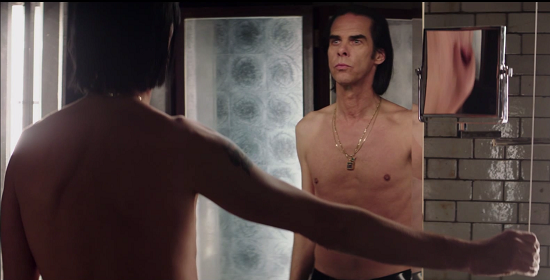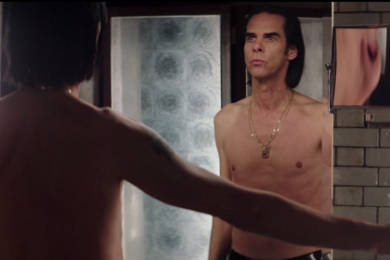The title of Iain Forsyth and Jane Pollard’s film comes from a line in one of Nick Cave’s notebooks, a calculation of how long he had been alive at that point. The two visual artists (who once brought Ziggy Stardust back to life for a live art performance at the ICA) recreated this 20,000th day for the film, set in his adopted hometown of Brighton. If ‘scripted reality’ is a TV thing now, then 20,000 Days… might be seen as a new genre of ‘constructed documentary’. Forsyth and Pollard create sets, book Cave various appointments, then – for his voiceover – feed him subjects such as the creative process, performance, beauty and identity. They seem to tap into Cave, and wittily-told stories, emotive memories and melancholy musings pour out of him like maple syrup.
The appointments that the directors book for him involve casual studio time; a session with a psychoanalyst; a bite to eat with his friend and bandmate Warren Ellis; a trip to a fictionalised Nick Cave archive; then back for pizza with his young boys in front of Scarface on TV. These appointments are punctuated by car journeys where Cave chats with ‘apparitions’ of collaborators and friends, former Bad Seed Blixa Bargeld, Ray Winstone, and Kylie Minogue. These brief snatches of conversation in the car are the Achilles heel in a film that is otherwise supremely thought provoking and engaging. They appear stifled and incongruous, offering up less of Cave then the other parts of his day. If Kylie et al were such a big part of Cave’s story perhaps they should have been afforded more screen time?
As the clock ticks, Cave saunters about his business – chatting, singing, mulling – and we’re offered a rare glimpse into his stream of consciousness, albeit one that’s from the mind of an eloquent, master storyteller. Occasionally, Cave is a virtually silent character in his own movie, Warren Ellis does a lot of the talking, as he cooks up an eel supper in his remote hilltop cottage (also staged by the filmmakers). Cave does open up when questioned, but you get the sense that, like us, he’s watching his life play out whilst considering what it all means. When he does speak, his words are chosen carefully and are never wasteful. The scattered scenes with acclaimed psychoanalyst Darian Leader are perhaps the most revealing. Cave had no idea what he was going to be asked as he sat in the chair, and had not met Leader before the cameras started rolling. They ended up talking over two days for almost ten hours, and when the atmosphere becomes tangibly raw (notably when Cave discusses his father), the scene respectfully cuts just as he’s on the verge of tears; preserving the icon and protecting the man within. Presumably, this B-roll won’t appear on the DVD extras…
Erik Wilson’s unobtrusive and lingering camera captures every nuance as Cave makes the normal look magical, whether he’s reading an observation on clouds from an old notebook, chatting about old photos of his digs (and their strange décor which included human hair), or ordering tea from his piano. And the music is never far away, of course. We spy on Cave as he nonchalantly crosses out lyrics on his music sheet (lyrics, no doubt, that any other musician would have leapt on), we’re tickled watching the imposing, excellently-bearded form of Warren Ellis as he directs French school kids in a studio session, and we marvel at Cave’s on-stage charisma as adoring fans reach up to touch him.
Alongside the Cave-Ellis score, his latest album Push the Sky Away features heavily, but this is far from a concert movie, or a sycophantic biopic. 20,000 Days… is an ode to creativity, and by simply watching you’re allowing yourself to be inspired to spend your time on Earth more productively. ‘There is a strand of [modern] culture that says almost anyone can do it; be made into a successful star,” says co-director Pollard. “But I want us to celebrate those remarkable practitioners, the Cohens, and the Dylans and the Caves, who have carved their own persona and path, who work magic with words and music.” With their film, Forsyth and Pollard manage to hit the sweet spot where imagination meets reality, in Cave’s own words: “where the gears of the heart really change.” And he gets those gears going with anecdotal tales about Nina Simone (whom he booked for 1999’s Meltdown festival) and the nature of performance, and with poignant memories of his Dad reading Lolita to him at a young and impressionable age.
“Memory is what we are – your very soul, and your very reason to be alive is tied up in memory,” says Cave to the psychoanalyst. As 20,000 Days… hinges on these memories it’s a good job that Cave’s led such an interesting life, encountered so many interesting people, and that he’s willing to bare a bit of his soul for us in something other than song lyrics. If it’s been 20,000 days for Nick Cave let’s hope there will be many, many more.



